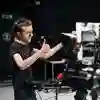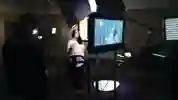


Explore the history and culture of film and the practical side of filmmaking on this hands-on course.
Gain in-depth theoretical knowledge studying under experts. Develop your technical skills in cutting-edge facilities. And build the critical and personal skills you need to succeed in the creative industries and beyond.
You’ll benefit from our strong relationships with industry too, with awesome placement opportunities and extra-curricular activities that can help your CV stand out from the crowd.
About this course
Gain the creative skills, technical expertise and industry insight to become a work-ready professional. A blend of hands-on skill and thought-provoking theory, this course prepares you for a broad range of careers.
You’ll get a deep understanding of cinema's history and culture. Explore films from across history, continents and genres. Be taught by experts in horror, TV drama, British and Hollywood cinema. And hone your filmmaking skills in our cutting-edge facilities like our on-campus filming and editing suite.
Our links to regional film and media organisations like Screen Yorkshire’s Connected Campus and the Northern Media Mentors give you invaluable work experience opportunities to help break into this competitive industry. These links also give you access to bootcamps, masterclasses and visiting guest speakers to further prepare you for a career in the film and TV industry.
As our region grows in popularity and significance as a film location, so do opportunities to get real-world experience in the industry. Our students have gained experience on several film and TV productions including The Crown, David Copperfield, and Enola Holmes 2.
Get ahead by going behind the scenes
Module options
Each year, you’ll study modules worth a certain number of credits, and you need 120 credits per year. Most modules are 20 credits – so you’ll study six modules each year. Some longer modules, such as a dissertation, are worth more. In these cases, you’ll study fewer modules - but the number of credits will always add up to 120. Some modules are compulsory, some are optional, so you can build a course that’s right for you.
Filters
Screen Storytelling
Learn how structure and style shape film narrative through classroom- and studio-based learning.
compulsory
20 credits
Entertainment Empires
What has made entertainment one of the most powerful and influential businesses across the world?
The entertainment industry continues to shape the way we think, create and express ourselves. From all the corners of the globe, entertainment has an impact on our lives and has become a highly profitable national and transnational economy.
You’ll explore entertainment, its creative growth and power. As well as how it has become, and continues to be, one of the most influential industries in the world.
compulsory
20 credits
Introduction to Filmmaking
On this hands-on module, we'll introduce you to our extensive technical resources. But more importantly, we'll teach you how to choose the right tool for each job. How to coordinate action and understanding among your whole crew, so you can succeed in the most fundamental filmmaking task: solving creative problems.
You’ll develop your creative practice skills and learn the fundamentals of practical filmmaking. Whether you’re making film or professional online content, understanding established filmmaking techniques and practice are essential for success. We’ll guide you through a range of film production techniques, processes and methods.
So, by the end, you’ll be well prepared to tackle the rest of your degree. But more than that, you’ll have the skills to take your first steps toward becoming an industrial and recognised film professional.
compulsory
20 credits
Screening Identities
How are gender and other aspects of identity represented on screen? Explore the variety and the ethical implications of screen media’s engagement with identity politics.
compulsory
20 credits
Introduction to Documentary
Reflect on how filmmakers have tried to capture reality, and plan your own documentary project.
compulsory
20 credits
Researching the Creative Industries
How do you build a career in the creative industries? How do you negotiate copyright, funding processes, and legal requirements? This module helps you answer these questions.
compulsory
20 credits
Public Service Media
What role do media outlets and media content have to play in the cultivation of informed citizens, equipped to participate in the world around them? And how can media producers play this role in an era of almost infinite choice?
compulsory
20 credits
Film Music
Open your ears to the vital but unappreciated role that film music and sound play in creating experience and meaning.
optional
20 credits
Post Television: Production Practice and Content Creation
What can studying television teach us about contemporary screen content? On this module you will work on producing content, informed by an exploration of how television has been made and addresses its audience throughout its history and up to the present day.
optional
20 credits

Want to be a filmmaker? This is where you start.
Featured module
- compulsory
- 20 credits
On this hands-on module, we'll introduce you to our extensive technical resources. But more importantly, we'll teach you how to choose the right tool for each job. How to coordinate action and understanding among your whole crew, so you can succeed in the most fundamental filmmaking task: solving creative problems.
You’ll develop your creative practice skills and learn the fundamentals of practical filmmaking. Whether you’re making film or professional online content, understanding established filmmaking techniques and practice are essential for success. We’ll guide you through a range of film production techniques, processes and methods.
So, by the end, you’ll be well prepared to tackle the rest of your degree. But more than that, you’ll have the skills to take your first steps toward becoming an industrial and recognised film professional.
Our facilities

Watchlist
Degrees that live up to life
Course montage
1 min
BA Film Studies overview
Course overview
3 mins
Life on campus
University life
2 mins
Film and Media Facilities
Course Highlight
2 mins
Featured academics
You’ll be taught by enthusiastic, expert staff who are as passionate about their field as they are knowledgeable. With expertise and professional experience spanning a wide range of genres, they bring diverse perspectives and a deep love for their subjects into every class, ensuring an engaging and well-rounded learning experience.

Dr James Zborowski
Senior Lecturer
James teaches and researches in the areas of film, TV, media and cultural studies. Through teaching close analysis of film style, he supports students to become better critics, and to think like filmmakers.

Dr Laura Mayne
Lecturer
A film historian who specialises in post-war British cinema, Laura is a published author. She co-wrote Transformation and Tradition in Sixties British Cinema, a reassessment of the nature and significance of British cinema and the film industry.
Entry Requirements
What do I need?
This course is currently available through Clearing, which means our entry requirements are a bit different to what they would normally be.
At Hull, you're a name not a number. During Clearing, we look at all of your qualifications and experience, not just your academic grades. We may be able to offer you a place whatever your situation. Get started by completing our eligibility checker, and find out immediately if you could study at the University of Hull.
Have questions? Our admissions team will be happy to help.
Fees & Funding
How much is it?

Future prospects
You’ll develop a broad range of professional skills that will enable you to go on to careers in a variety of fields including the creative industries.
Our graduates have on to careers in TV and film production, publishing, costume design, crew and events management, charity and marketing.
Become part of the next generation of futuremakers
Like what you've seen? Then it's time to apply.
The standard way is to apply through UCAS. This will give you the chance to showcase your skills qualities and passion for the subject, as well as providing us with your academic qualifications.
Not ready to apply yet?
Visit our next Open Day, and see all that the University of Hull has to offer. Talk to our lecturers about your subject, find out what university is really like from our current students, and take a tour of our beautiful campus and amazing facilities.
You may also be interested in...
94% employability (Screen) UK domicile full-time first degree leavers; Higher Education Graduate Outcomes statistics, for the academic year 2022/23, published by the Higher Education Statistics Agency June 2025.
Media Studies: Ranked 7th for learning resources. National Student Survey (NSS) 2025, HEIs only.
Film: Ranked 10th in the UK for Teaching Quality. The Times and Sunday Times Good University Guide 2026.
All modules presented on this course page are subject to availability and this list may change at any time.